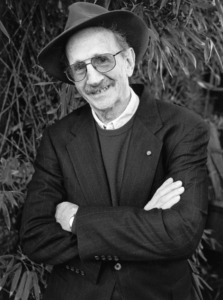By Norah Christianson
Starlight
By Philip Levine
My father stands in the warm evening
on the porch of my first house.
I am four years old and growing tired.
I see his head among the stars,
the glow of his cigarette, redder
than the summer moon riding
low over the old neighborhood. We
are alone, and he asks me if I am happy.
“Are you happy?” I cannot answer.
I do not really understand the word,
and the voice, my father’s voice, is not
his voice, but somehow thick and choked,
a voice I have not heard before, but
heard often since. He bends and passes
a thumb beneath each of my eyes.
The cigarette is gone, but I can smell
the tiredness that hangs on his breath.
He has found nothing, and he smiles
and holds my head with both his hands.
Then he lifts me to his shoulder,
and now I too am there among the stars,
as tall as he. Are you happy? I say.
He nods in answer, Yes! oh yes! oh yes!
And in that new voice he says nothing,
holding my head tight against his head,
his eyes closed up against the starlight,
as though those tiny blinking eyes
of light might find a tall, gaunt child
holding his child against the promises
of autumn, until the boy slept
never to waken in that world again.
In Starlight, Philip Levine recalls—from the point of view of himself as a four-year-old—a starry summer night when his father asks him, in a “new” voice thick and choked with emotion, if he is happy. The child does not quite understand what happy is, so says nothing. Then the father passes his thumb under the boy’s eyes to check for tears. Finding none, he smiles and lifts the boy to his shoulders so the boy, too, is “there among the stars.” And then it is the boy who asks his father, “Are you happy?” “Yes! Oh yes! Oh yes!” his father answers.
It’s curious, the memories we have of our childhood. These memories are not always dramatic or historically important, but they stay with us and crop up at odd times. I remember being three or four and being lifted onto a kitchen counter by some unknown lady who handed me an oven mitt shaped like a cat. That’s it. The blandest of memories. It floats across my mind every month or so. And it is so vivid, I believe I could draw that cat mitt in exact detail. (Oh, Freud! Was it you who said, “Time spent with cats is never wasted”?)
But other memories are deeper in meaning. In Levine’s memory-poem, the boy remembers that the father’s eyes are closed against the starlight, as though the stars —“tiny blinking eyes” —might see the father as a “tall, gaunt child” who is holding the boy, protecting the boy “against/the promises of autumn” (impending decay, death). The father holds the boy until the boy falls asleep, never to waken again in that world, i.e., in that same particular moment in time with his father.
We understand that Levine, writing as a man, has matured enough to feel empathy for his father. He remembers smelling the tiredness on his father’s breath, remembers his father’s concern, love for him. These are things he might have felt from his father when a child, but not have intellectually realized or appreciated until the present.
This, then, is my interpretation of the poem. Am I correct? I don’t know. The problem lies in the last four lines, which are ambiguous. I have read the poet Rita Dove’s interpretation and don’t comprehend it. (I don’t know which one of us is the dunderhead.) I have read Christopher Buckley’s interpretation and found it lame. Other interpretations have seemed vague or definitely incorrect (in my opinion). You can, if you like, hear Philip Levine himself reading Starlight on YouTube. Before he begins reading, he says, “I don’t have much to say about Starlight, I don’t think.” So…we’re not getting any answers from him either.
In the end, it is you, the reader, who must decide for yourself what the poem means for you. Remember my admonishment some time back: “A poem should not mean/But be.” (from Archibald MacLeish’s Ars Poetica,) Well. So that’s my excuse for this week!

Philip Levine was born in Detroit in 1928 of Russian-Jewish immigrants. His father died at 35 years old. Levine was only five. (One year older than he is in the poem.) At 14, Levine began working in the auto factories, including the night shift at the Chevrolet Gear and Axle factory, building transmissions for Cadillac, and working at Breslin’s First-Rate Plumbing and Plating. He managed to get an education at Wayne State and the University of Iowa, but he was no fancy academic poet. Instead, he committed himself to writing very simply about the working class and the dignity of the working man. He won the Pulitzer and the National Book Award, among other honors, and served as Poet Laureate from 2011 to 2012. Levine died in 2015 in Fresno, California.

